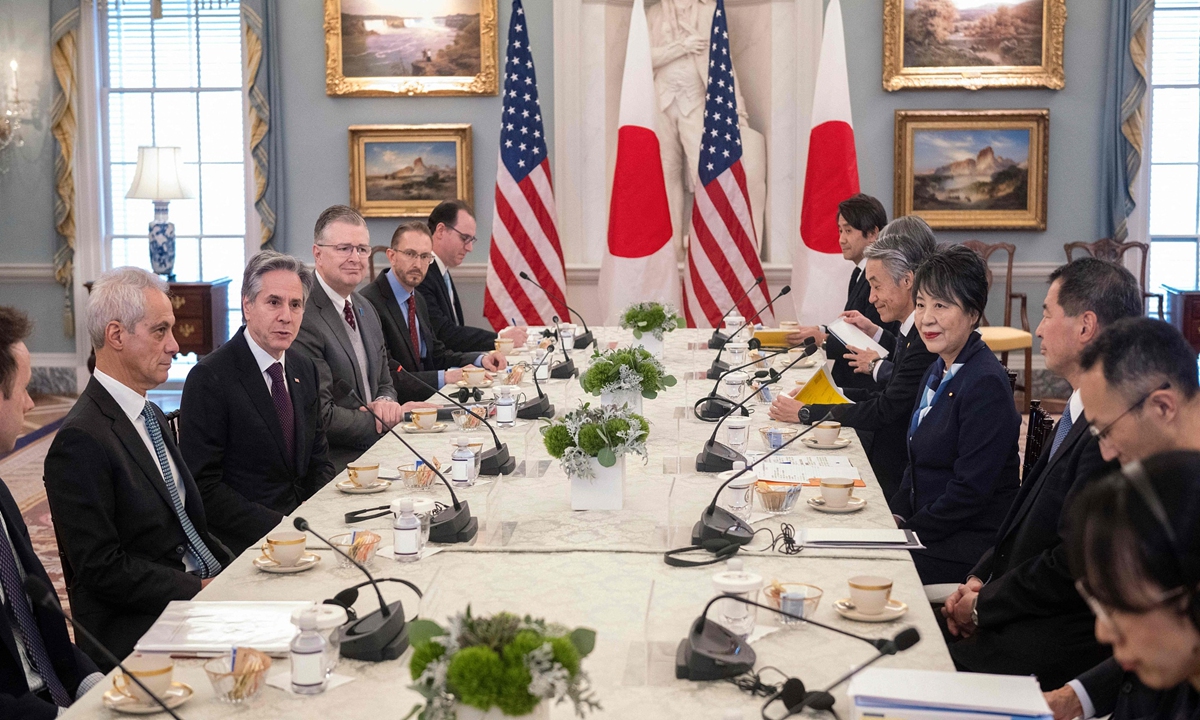(来源:《环球时报》(Global Times),2024-01-14)

US Secretary of State Antony Blinken (3rd L) meets with Japan's Foreign Minister Yoko Kamikawa (4th R) at the State Department in Washington, DC, on January 12, 2024. Photo: VCG
As Japanese Foreign Minister Yoko Kamikawa met with US Secretary of State Antony Blinken in Washington on Friday afternoon, analysts on Sunday said that the main purpose of the visit is to lay the groundwork for Japanese Prime Minister Fumio Kishida's upcoming state visit and meeting with US President Joe Biden amid a politically unstable environment in Japan.In the talks, the two foreign ministers agreed that the two countries will closely work to address issues regarding China and North Korea, according to Japanese media outlets.
Kamikawa, in remarks ahead of their talks, signaled that Tokyo's alliance with Washington was crucial to facing down challenges in Asia and elsewhere..
Experts pointed out that the main purpose of Kamikawa's visit to the US is to lay the groundwork for Kishida's upcoming meeting with US President Biden.
During the roughly one-hour talks, the two top diplomats agreed to continue working toward an official state visit to the US by Kishida early this year.
While the exact timing of the Kishida visit remains unclear, media reports have said Kishida could make the trip in March.
The Japanese foreign minister's US visit is a form of preliminary consultation, and if there are no special circumstances, Kishida's visit to the US in March should proceed as planned, Wang Guangtao, an associate research fellow with the Center for Japanese Studies at the Shanghai-based Fudan University, told the Global Times on Sunday.
The anticipated outcome of this planned Kishida's visit to the US may not be very positive amid concerns over the political funding issues within the factions of the ruling Liberal Democratic Party in Japan. In terms of the Japan-US relationship, Kishida's visit to the US in March, while he is still in office, could be seen as a way to declare the end of his political career, Wang noted.
The significance of his visit is questionable because Kishida's domestic approval ratings are currently not high, and support for the Liberal Democratic Party among the Japanese public is relatively low. Additionally, a series of secondary disasters caused by earthquakes has greatly affected the image of the Kishida administration. As experts put it, it may not be the right time for Japan to overly communicate with the US during this period.
During this visit, the Japanese side is likely to discuss how to strengthen the principles of the US-Japan alliance in the new environment, Li Haidong, a professor at the China Foreign Affairs University, told the Global Times on Sunday. It aims to maintain a strong foundation for the US-Japan alliance in the face of uncertainties after the Taiwan regional elections and ahead of the upcoming US presidential elections, Li pointed out.
